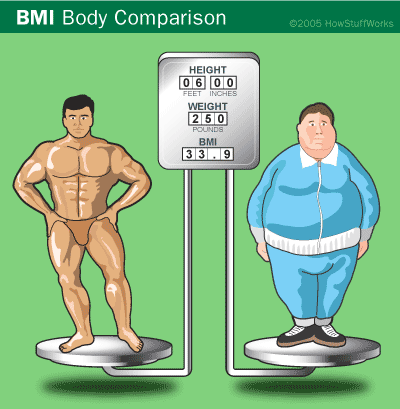 Mother Jones posted an article questioning whether the body mass index is “a big fat scam.” It raises questions about the measure itself, the extent to which it is a predictor of health, and the politics.
Mother Jones posted an article questioning whether the body mass index is “a big fat scam.” It raises questions about the measure itself, the extent to which it is a predictor of health, and the politics.
See article: Click Here
In brief, the authors write:
“Doctors typically use BMI to advise their patients: If you’re below 18.5, you’re underweight; 18.5-24.9 is normal; 25-29.9 is overweight; and 30-plus is obese.
There’s just one problem: A higher BMI doesn’t necessarily mean you’re less healthy. In fact, patients with heart disease and metabolic disorders whose BMIs classify them as overweight or mildly obese survive longer than their normal and underweight peers. A 2013 meta-analysis by the National Center for Health Statistics looked at 97 studies covering nearly 3 million people and concluded that those with overweight BMIs were 6 percent less likely to die in a given year than those in the normal range. These results were even more pronounced for middle-aged and elderly people. This is known as the obesity paradox. “The World Health Organization calls BMIs of 25 to 29.9 overweight,” says Paul McAuley, an exercise researcher at Winston-Salem State University. “That is actually what is healthiest for middle-aged Americans.”
“And get this: While epidemiologists use BMI to calculate national obesity rates (nearly 35 percent for adults and 18 percent for kids), the distinctions can be arbitrary. In 1998, the National Institutes of Health lowered the overweight threshold from 27.8 to 25—branding roughly 29 million Americans as fat overnight—to match international guidelines. But critics noted that those guidelines were drafted in part by the International Obesity Task Force, whose two principal funders were companies making weight loss drugs. In his recent book Fat Politics: The Real Story Behind America’s Obesity Epidemic, political scientist Eric Oliver reports that the chairman of the NIH committee that made the decision, Columbia University professor of medicine Xavier Pi-Sunyer, was consulting for several diet drug manufacturers and Weight Watchers International.”
The measure itself is problematical. People with muscle will likely have higher BMI, but the BMI does not account for that differential.
Sometimes simple measures are not as accurate as we would like, making prediction about causality problematical. This is a great topic for those looking to explore the nexus of science, the media, public policy, and politics.
links: Washington Post article: change to BMI standard: Click here
Link to obesity meta analysis study:Click here